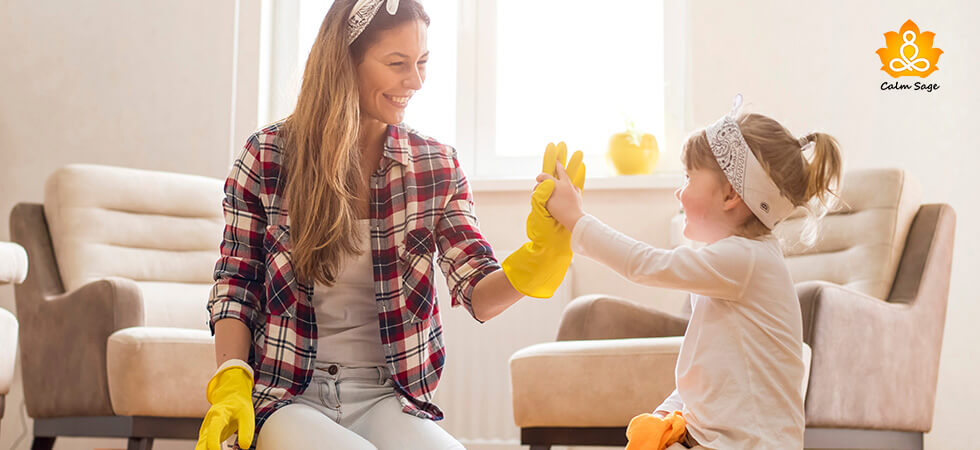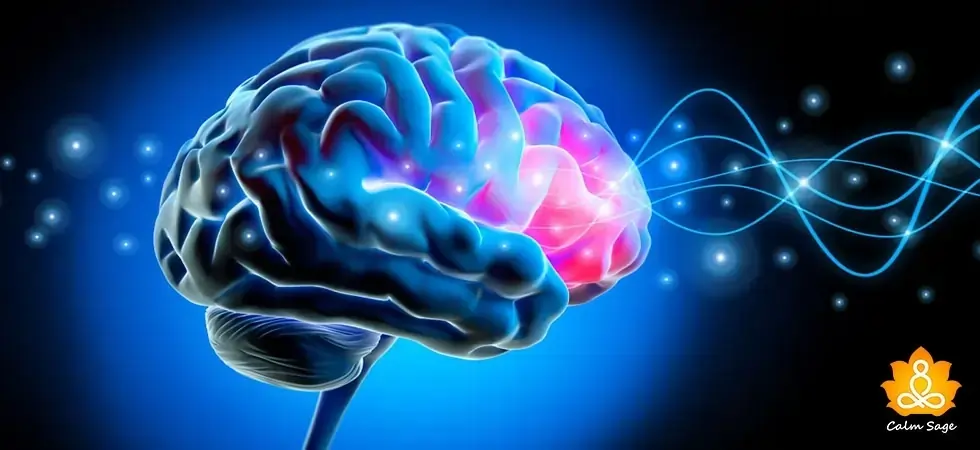How Decluttering is Good for Your Mental Health

These days dealing with stress is a common occurrence and all of us have different ways of stress relief, don’t we? I mean, some people (much like me) prefer stress baking while others may prefer going for a massage. You may prefer doing yoga while your neighbor may prefer stress cleaning.
Yes, you read it right! Stress cleaning. Personally, the idea of decluttering and cleaning my house gives me stress but some people benefit from cleaning and decluttering their living space. Well, to each their own, right?
What many people fail to recognize is that cleaning and mental health are closely linked. Many people find cleaning a way to unwind and destress after a particularly overwhelming day.
In this blog, I’ll be exploring the psychology of clutter and disorganization, the positive effects of cleanliness, and how you can incorporate decluttering as a daily mindfulness technique.
Psychology Of Clutter & Disorganization
Having a clean house isn’t just a sign of neat and healthy living but the process of cleaning can impact the betterment of your mental health. Research also suggests a connection between cleaning and mental health.
Here’s how clutter can negatively affect your mental health:
1. Can Increase The Risk Of Depression: If you live in a more decluttered space, you’re more likely to increase the risk of depression. A messy, cluttered, or disorganized home can increase your cortisol levels, hence increasing stress levels too.
2. Can Cause Lack Of Focus: In a study, it was found that clutter and disorganized home can cause a lack of concentration and focus on a task. Additionally, living in a cluttered space can also increase confusion and tension – mental and physical.
3. Can Increase Negative Emotions: Clutter is also recorded to increase negative emotions such as anger, irritability, and unstable mental health while a clean house can improve mental health, increase calm, and promote overall well-being.
Clutter, to the brain, can translate as unfinished business, one that can increase stress especially if you’re already overworked and stressed. Clutter and disorganization can not only increase stress but can also increase your risk of depression and anxiety. While cleanliness and decluttering your space can increase feelings of control and promote positive emotions such as calmness.
7 Positive Effects Of Cleanliness
A clean house can promote a healthy mind. Here are 7 positive effects of cleanliness:
1. Reduces The Risk Of Depression
No one wants to come to a cluttered and disorganized home after a long workday. When you clean the house regularly, it can help reduce the cortisol levels, further reducing stress and the risk of developing depression and anxiety. Experts believe that if cortisol levels run high day and night, it can eventually take a toll on your health. So try to keep your house clean to avoid being stressed.
2. Improves Your Eating Habits
In a study, it was found that living in a clean house can improve your eating habits as well and can help you make better dietary decisions. For example, if you’re working in a neat and clean space then you’re likely to choose a healthy snack such as fruits over others working in a cluttered space.
Remember, clutter and a messy space can increase your stress and to combat the stress, you may choose unhealthy snacks or overeat as a coping mechanism.
3. Promote Physical Health
Of course, when you take time to clean your house, you keep a track of your physical activity. Physical exercises can boost endorphins, our body’s natural painkillers. When endorphins are released, stress is reduced. Moreover, once you get into a cleanliness routine and stick to it, then you’re more likely to stick to other physical exercises and routines too.
4. Strengthen Relationships
Yes, you read it right. Cleanliness can also promote and strengthen relationships. Logically, you’re less likely to argue with your partner in a clean home than in a cluttered space.
Yes, lack of cleanliness can not only cause a pile of dirty dishes but can also negatively affect your relationships. A clean house means less resentment, less social embarrassment, less self-isolation, and more happiness – body and mind.
5. Improves Productivity & Focus
In an unclean house, no one can thrive. Living in a cluttered house can reduce your productivity and cause a lack of focus. However, when you live in a clean house then a positive effect of cleanliness can be improved productivity and clear focus. A clean house can make your brain process information easily as it is less likely to be distracted by clutter.
6. Boosts Your Mood
As I’ve previously mentioned, cleanliness as a physical exercise can release endorphins. Endorphins, one of the four happy hormones, can help boost your mood. The more you live in a clean space, the more it can have a positive effect on your mood.
Moreover, a cluttered house means musty smells but a clean house means a better smelling house. And let’s face it, certain smells can also affect your mood. For example, the smells of rosemary and peppermint can energize the mind while lavender can soothe your mind and calm your soul.
7. Better Sleep
If living in a cluttered house can increase your risk of depression and anxiety, then how can it not affect your sleep? Another positive effect of cleanliness is that it can promote better sleep.
Did you know that in a study it was found that 75% of people reported better sleep when sleeping on clean sheets? Additionally, making your bed in the morning can also be linked to better mental health.
How To Incorporate Cleanliness Into Your Life?
No matter how chaotic life may be, you can still incorporate cleanliness as a mindful practice into your daily life. How? Let’s take a look!
1. Start One Step At A Time:
Cleaning can look like a daunting task when you plan on taking too much at a time. Instead, take one small step at a time. For example, rather than cleaning the whole house over the weekend, clean one room at a time. You can also create a small to-do list that you can check every time you tackle a small space.
2. Be Mindful Of The Time:
Another way to incorporate cleanliness into your routine without making it a daunting task is to set a timer. For example, set 15-20 minutes of your day to clean your house. Again, start small. In those 20 minutes, you can clean the kitchen counter or take care of the scattered laundry.
3. Don’t Do Everything Alone:
It’s okay to take help from others even when it comes to cleaning the house. You don’t have to take the stress of cleaning the house on your shoulders alone. Whenever possible, ask your partner, children, siblings, or friends to give you a hand with cleaning so that you don’t feel overwhelmed or stressed.
4. Get A Housekeeper:
If your budget allows, then you can also hire housekeeping services to help you declutter the house and maintain its cleanliness. To keep the cost low, you can divide some cleaning tasks. For example, you can take care of the laundry while leaving cleaning the rooms to the helper.
Wrap Up
Some people find cleaning a good outlet to release stress and if cleaning is your way of reducing stress and anxiety, and improving your mood then go for it! A cluttered and disorganized home can be too distracting and can negatively affect your mental as well as physical space.
Take note of the positive effects of cleanliness and decluttering and just go for it. Maybe you won’t be able to do it all in one day, one week, or one month but that’s OK too. Take your time, set your pace, and clean on your terms. Hire help when it becomes necessary or overwhelming.
“Cleanliness may be defined to be the emblem of purity of mind.” – Joseph Addison
I hope this article helped you understand the positive effects of cleanliness and how to incorporate it into your daily lives. For more, you can write to us at info@calmsage.com or DM us on social media.
A clean home equals a healthy mind. Let us know what you think about cleaning and mental health in the comments below.
Take care!




















